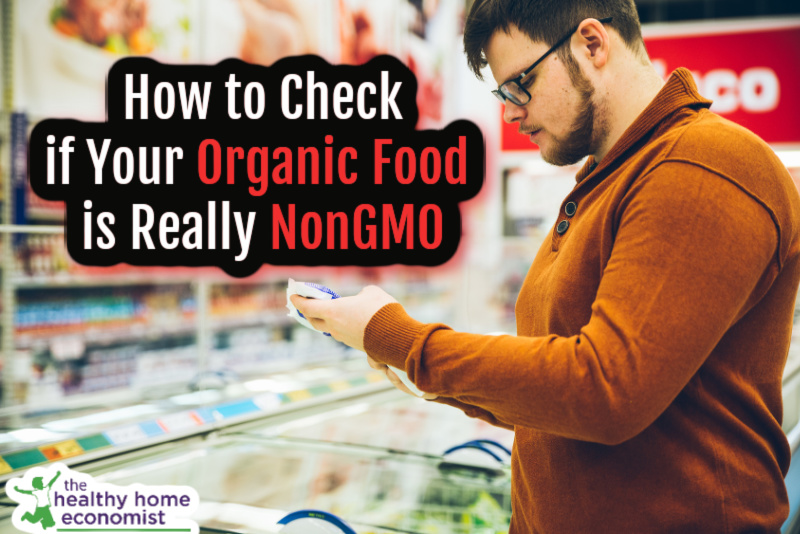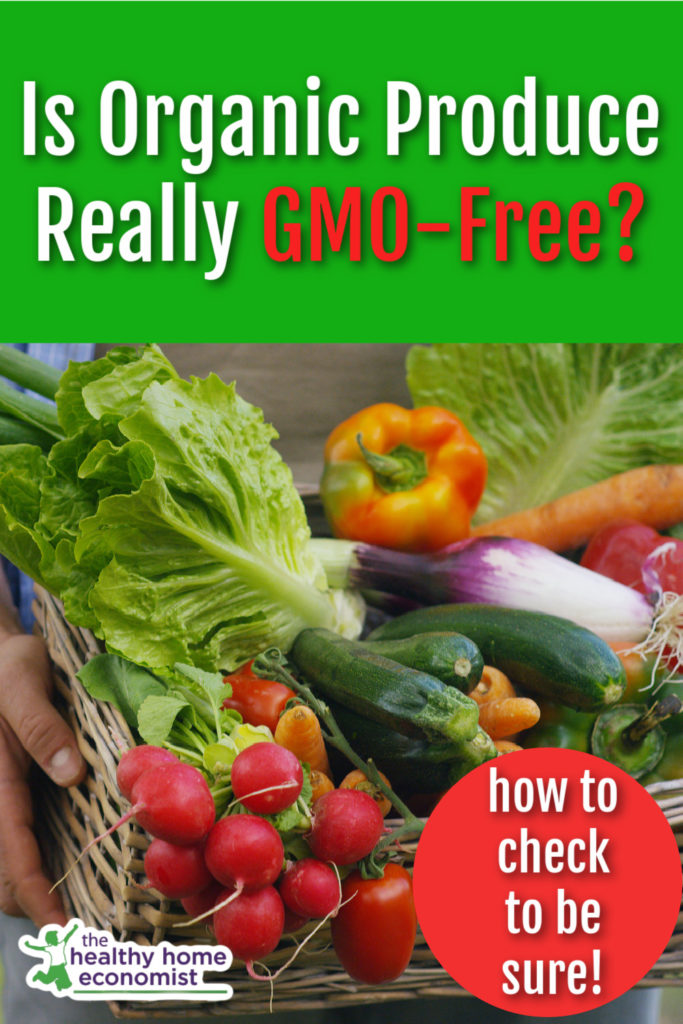How to identify whether organic produce and other certified products are also free of GMOs for the cleanest, most nutritious food possible.
More and more people are realizing how important supporting organic farms is to long-term health. While it is next to impossible to avoid chemicals completely unless you live in a hut in the middle of a rainforest, avoiding them in your food is a critical component of any wellness strategy.
As Joel Salatin of Polyface Farm likes to say, “If you think organic food is expensive, have you priced cancer lately?”
Joels is not exaggerating this point!
The peer-reviewed journal JAMA Internal Medicine published a study in 2018 which found that a higher frequency of organic food consumption was associated with a reduced risk of cancer. (1)
While this study is encouraging, it is important to note that it was conducted in France. In the European Union (EU), organic standards are far stricter than USDA Organic!
What this means for US consumers is that they must do far more than buy organically certified food if they want their diet to be maximally clean and nutritious.
Let’s go into a bit more detail about this and how to bridge the gap by seeking additional certifications for your organic food.
Organic Food Not as Clean as Most Believe
By severely watering down the meaning of organic over the years, the USDA has caused organic food to fall behind the EU in quality and nutritional content.
Most people assume that USDA Organic is the most nutritious food you can buy, but that is actually not the case.
There are loopholes in the classification of organic food that are very concerning.
In my view, these oversights are so big that, in some cases, multiple certifications are necessary if you want the cleanest, most nutritious food possible.
Organic Does Not Mean GMO-Free
A huge problem with USDA Organic is the potential for GMOs.
Most consumers have no idea that foods stamped USDA Organic can legally contain up to 5% GMO ingredients! (2)
The failure of the USDA to protect consumers by prohibiting GMOs in organic foods and requiring GMO labeling on nonorganic foods are two reasons why the Non-GMO Project has grown so rapidly in just the past few years.
Cross-Contamination
When it comes to sourcing some foods, it is best to insist on both organic AND nonGMO verified certifications.
This is because cross-contamination of organic crops is a BIG problem.
USDA Organic certification does not guarantee that the food hasn’t been contaminated with GMO crops that were grown in the vicinity.
This is particularly important for crops like corn, since over 90% of corn grown today is GMO.
To solve this problem, I recommend getting foods that are BOTH organic AND nonGMO verified.
For example, Arrowhead Mills organic cornmeal is nonGMO verified. Bob’s Red Mill organic cornmeal is not.
Which to choose? Hands down, I would recommend Arrowhead over Bob’s Red Mill.
Organic Hydroponics: Low Nutrition Produce
The past few years have seen the shocking invasion of unnaturally large, poor quality, water-logged hydroponic produce into the organic market.
The consumer has absolutely no idea because this produce is not properly labeled.
This is by design as most consumers would not buy organic hydroponics if it was labeled as such.
They would quickly learn that hydroponic produce tends to rot or get moldy extremely fast. This is a red neon sign indicating that it contains little nutritional value as well.
To avoid this problem, when you buy produce, seek out farms that include certification by the Real Organic Project. (3)
This ensures that the produce was grown in nutrient-rich soil and not some cheap, soil alternative. It is the best way to ensure that the money you spend on organic produce is actually nutritious and worth the higher price of conventional.
Bridging the Gaps in USDA Organic
In sum, by seeking out organically certified products that are also NonGMO Verified and produce certified by the Real Organic Project, consumers can be assured of organic food quality that is more on par with the EU and supportive of the cancer-lowering risks identified in peer-reviewed research.

References
(1) Association of Frequency of Organic Food Consumption With Cancer Risk
(2) Is Organic Always GMO-Free?
(3) The Real Organic Project








The solution is ditching the veggies/fruit out of season. Use traditional preservation methods like lacto-fermentation, or, better yet, eat more animal products. Even conventional meat is better than organic plant (avoid fat that stores the toxins). Carbs in any form are not necessary for survival anyway.
“Greenhouse = hydroponics”
Thanks for this information, Sarah. Won’t be purchasing anything by Wholesum anymore. ?
“These are very real concerns that companies would just as soon consumers stay in the dark about because it costs them more money to get additional certifications to ensure their products are clean.”
“it’s interesting how organic farms are not recognizing the very real and growing risks of cross-contamination from GMO crops growing nearby.”
Yes, it seems that these companies are purposely being deceptive. As usual, it’s always about MONEY. ? In fact, if I get a chance, I may call them up and tell them that their information is inaccurate. I think, when possible at least, it’s best to avoid any companies that are deceptive. Speaking of deceptive, the first ingredient in Organic Valley’s sour cream is in fact powdered skim milk! ? (I called them to confirm this.). They also sell “raw” cheese that isn’t really raw. I like a lot of their products, but you just have to be careful.
Some more info. I just called Earthbound Farms and asked how their produce is grown. They said that all their produce is grown in soil in outdoor fields. I then asked, “Does that include all your frozen produce as well, some of which comes from other countries, like Chile?” They said “yes.”
It’s interesting that on their Web site, though, Earthbound Farms too is insisting that organic means non-GMO: ?
“Organic Means Non-GMO We’re often asked if our Earthbound Farm USDA-certified organic products are ‘Non-GMO Verified.’ It is very important to understand that the use of genetic engineering, or genetically modified organisms (GMOs) is expressly prohibited by the USDA’s National Organic Program standards.
“This means we can’t plant GMO seeds, nor can we use any GMO ingredients in producing any of our final, packaged products. To meet the USDA organic regulations, we must document that we aren’t using GMOs and that we are protecting our products from contact with prohibited substances from farm to table.”
Thanks for the info … it’s interesting how organic farms are not recognizing the very real and growing risks of cross-contamination from GMO crops growing nearby.
I went to my local grocery store today, and felt like a detective. ?
First off, I rejected some organic produce by Wholesum because it came from Mexico. And on their Web site, they say that much of their produce is grown as follows: “Greenhouse (high tech).” What exactly does that mean? No soil involved?
Next, I went over to the organic dairy products. The Rumiano cheese has both organic and non-GMO certifications. On the other hand, the Organic Valley products all say “organic is always non-GMO.” So, are they just being deceptive so that they don’t have to pursue non-GMO certification? ?
Greenhouse = hydroponics
Organic does not always mean nonGMO. The company is not admitting to the USDA regulations that allow a product to still be labeled as organic if it has less than 5% GMOs. Also, the company is not admitting to the problem of cross-contamination of organic crops. Note the organic farmers who have been sued by Bayer-Monsanto because their crops were cross contaminated with patented GMOs by accident (due to the wind).
These are very real concerns that companies would just as soon consumers stay in the dark about because it costs them more money to get additional certifications to ensure their products are clean.
It is worrisome that many Organic vegetables from Costco and other big box stores appear to be hydroponically grown, though not labeled as such, and thus, as you say, are of little nutritional value. For example, their Brussel sprouts and carrots do not contain a speck of soil or sand, which is highly unusual for these vegetables when grown in soil. Thus, you may be eating certified Organic carrots or Brussel sprouts, thinking it’s quality food for you and your family, but it’s only an empty shell that bears little comparison to the equivalent vegetable from 100 years ago.
I would like to know more about the hydroponic trend – might deserve its own post? How do huge industrial hydroponic farming operations fertilize their so-called “organic” produce? Do they feed it chemically-derived fertilizers that the lobbyists have pushed for, that would never have been included in the vision of those who formulated the first organic standards? Do they provide minerals, beneficial soil bacteria, etc. when using hydroponic methods? Do they use cleaning products in the tubes that bring the water to these plants grown on shelves instead of soil, and what do these cleaning products contain? Is there a high mold content as a result of the tubing needed for hydroponics, since rain and soil have been removed from the equation, and are harsh chemicals needed as a result? It used to be that Organic foods were more nutritious than conventional ones, but has Organic hydroponics wiped out that distinction? What do side-by-side comparison tests reveal about the nutritional content of Organic foods grown in carefully managed and remineralized soil, vs commercial soil, vs hydroponic operations?
It seems the integrity of the original USDA Organic standards have been so compromised and watered down by constant lobbying by the big producers, to enable them to cut corners and cash in on the public’s desire for healthy organic food – and in this case, eliminating soil which, if properly managed, brings life, nutrients and vitality to food.
Hi Beth, I’ve already written a couple of articles about the terrible trend of hydroponics in organic food. https://www.thehealthyhomeeconomist.com/organic-hydroponic-produce-not-for-me/
https://www.thehealthyhomeeconomist.com/hydroponic-invasion-of-usda-organic/
We are in New York and have started ordering from Misfits Market. The produce is said to be organic. We are ordering every two weeks, in an amount large enough to last that length of time. Thus far I’ve been very pleased with how well the produce lasts. I’m careful with it and store it properly but am familiar with the rotting problem that occurs with hydroponic produce. I’ve seen no trace of that.
Do you consider Misfits Market a decent source for organic fruit and vegetables?
Wow, had no idea about this. Thanks for the info. From now on, I’m going to try to make sure everything I get is both organic and non-GMO.